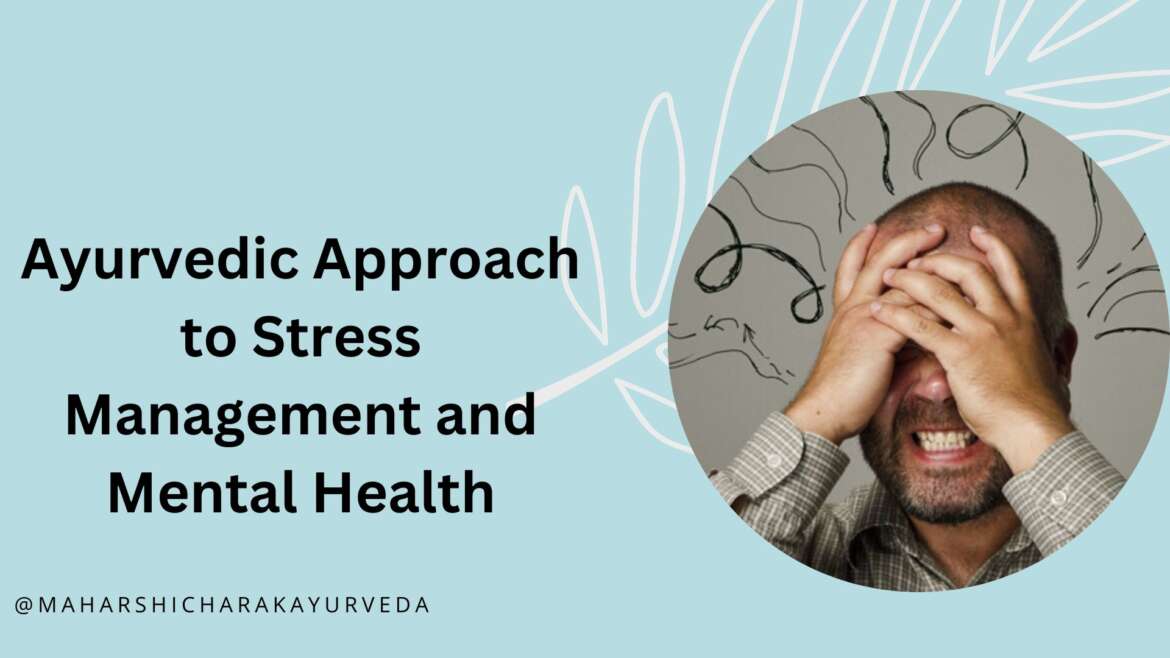In today’s fast-paced world, stress has become a common concern affecting mental health and overall well-being. Ayurveda, an ancient Indian holistic healing system, offers a comprehensive and time-tested approach to managing stress and nurturing mental health. Ayurvedic principles emphasize the interconnectedness of the mind, body, and spirit, recognizing that imbalances in one area can manifest as health issues in another. This integrative approach is crucial for addressing stress and mental health concerns.
Understanding Stress in Ayurveda
In Ayurveda, stress is viewed as an imbalance of the doshas—Vata, Pitta, and Kapha—resulting from external or internal factors that disrupt the body’s natural equilibrium. Stress can arise from an unhealthy diet, lack of sleep, negative emotions, environmental toxins, and irregular routines. Each dosha responds to stress differently:
- Vata individuals may feel anxious, restless, and scattered.
- Pitta individuals may experience irritability, frustration, and anger.
- Kapha individuals may feel lethargic, withdrawn, and prone to comfort eating.
Addressing stress in Ayurveda involves harmonizing these doshas through tailored approaches to restore balance.
Ayurvedic Strategies for Stress Management and Mental Health
- Balanced Diet According to Dosha: Ayurveda recommends a diet based on an individual’s dosha to maintain equilibrium. Vata types benefit from warm, nourishing foods; Pitta types benefit from cooling, hydrating foods; Kapha types benefit from warm, light foods.
- Routine (Dinacharya): Following a daily routine helps establish a sense of stability and predictability, soothing the nervous system. Consistent meal times, sleep schedules, and regular self-care practices are essential.
- Yoga and Pranayama: Yoga postures (asanas) and breathwork (pranayama) are vital for managing stress. Yoga calms the mind and strengthens the body, while pranayama techniques like Anulom Vilom and Bhramari help balance the doshas.
- Meditation: Regular meditation practice helps in calming the mind, enhancing focus, reducing stress, and promoting mental clarity. It can be tailored to suit an individual’s dosha for maximum benefits.
- Ayurvedic Herbal Remedies: Adaptogenic herbs like Ashwagandha, Brahmi, Tulsi, and Jatamansi are known for their ability to reduce stress and support the nervous system. They are often used in Ayurvedic formulations to manage stress and anxiety.
- Abhyanga (Self-Massage): Abhyanga, the practice of self-oil massage, helps in relaxing muscles, improving circulation, and soothing the mind. Warm sesame or coconut oil is typically used, and the massage can be calming for Vata and Pitta types.
- Practices for Mental Hygiene: Ayurveda advocates for practices like gratitude journaling, self-reflection, spending time in nature, and engaging in hobbies to maintain mental hygiene and reduce stress.
- Sensory Therapies (Panchakarma): Panchakarma, a detoxification and rejuvenation therapy in Ayurveda, includes therapies like Shirodhara (oil pouring on the forehead), Nasya (nasal administration of oils), and Abhyanga. These therapies help in relaxing the mind and body.
Doshic Approach to Stress Management
- Vata Dosha: For Vata individuals, establishing a regular routine, maintaining warmth and nourishment, engaging in gentle exercises like yoga, and incorporating grounding practices are essential. Warm, spiced teas and comforting, cooked foods help balance Vata.
- Pitta Dosha: Pitta individuals benefit from cooling practices, including meditation and gentle yoga. Avoiding spicy and heating foods, incorporating cooling herbs, and spending time in serene environments are helpful for balancing Pitta.
- Kapha Dosha: Kapha individuals need stimulation and invigoration. Engaging in vigorous exercises, maintaining a routine with variety, incorporating warming spices in the diet, and practicing regular pranayama to energize the body are beneficial for Kapha balance.
Stress-Reducing Ayurvedic Herbs
- Ashwagandha (Withania somnifera): Ashwagandha is an adaptogenic herb known for its stress-reducing properties. It helps in calming the mind, improving resilience to stress, and supporting overall vitality.
- Brahmi (Bacopa monnieri): Brahmi is a renowned herb for enhancing cognitive function, reducing anxiety, and promoting a calm mind. It supports mental clarity and focus.
- Tulsi (Ocimum sanctum): Tulsi, or holy basil, is a powerful adaptogen that helps in reducing stress, promoting relaxation, and supporting the nervous system.
- Jatamansi (Nardostachys jatamansi): Jatamansi is beneficial for calming the mind, enhancing sleep quality, and reducing stress and anxiety.
Incorporating Ayurvedic Practices for Mental Health
Incorporating Ayurvedic practices into daily life can significantly contribute to mental health and stress management. Tailoring these practices according to one’s dosha, maintaining a balanced diet, engaging in regular exercise, prioritizing self-care, and consult from an Ayurvedic practitioner are essential steps in this journey. Ayurveda promotes a holistic lifestyle that not only alleviates stress but also fosters overall mental and emotional well-being, ultimately leading to a fulfilling and harmonious life.





